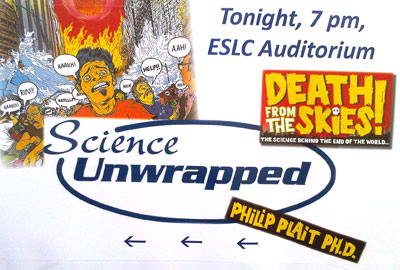Astronomer warns of ‘Death from the Skies’ in Science lecture
April 29th, 2012 Posted in OpinionStory & Photos by Mary Stocking
LOGAN—Dr. Philip Plait is known by many titles: astronomer, writer, blogger, speaker, comedian, anti-science crusher, and “The Bad Astronomer.” Plait appeared at Utah State this week to talk about “Death from the Skies.”
 Plait was on campus as part of the College of Science’s regular Friday “Science Unwrapped” lecture series, talking about his favorite topic: Space—meteors and comets to Hollywood’s inaccurate portrayal of how these things could destroy the Earth.
Plait was on campus as part of the College of Science’s regular Friday “Science Unwrapped” lecture series, talking about his favorite topic: Space—meteors and comets to Hollywood’s inaccurate portrayal of how these things could destroy the Earth.
• Sample Dr. Philip Plait’s “Bad Universe” on Discovery Channel.
Plait shared a clip from the 1998 film “Armageddon,” which he said has to be among the worst scientific movies ever. As actor/astronaut Bruce Willis engages the bomb button in his spacecraft high above the Earth to save all mankind from the pending doom of an asteroid, moisture seeps into his doomed ship. “Did you see it?” Plait said, disgusted with Hollywood’s lack of scientific knowledge. “It’s raining! It’s raining! On an airless asteroid! I’ll go ahead and leave you all to ponder on that.”
Plait also passed around a meteorite made up of pure iron. The main difference between comets and asteroids, he explained, is that asteroids are mostly rock or metal, or both, while comets are made up of frozen liquids and gases.
Comets can be more dangerous to earthlings than asteroids, Plait explained. “Comets, although similar to asteroids, can have really elliptical orbits that can take them way out of the solar system,” he said. “This makes comets more dangerous to humans because comets actually orbit the Sun, which is much farther out.”
 What that means is that comets have more time to speed up, so they can potentially strike the Earth at a significantly greater impact speed than that of an asteroid. “Comets explode with much larger energies, with their size many times bigger than asteroids,” he said. “This makes comets much more dangerous.”
What that means is that comets have more time to speed up, so they can potentially strike the Earth at a significantly greater impact speed than that of an asteroid. “Comets explode with much larger energies, with their size many times bigger than asteroids,” he said. “This makes comets much more dangerous.”
Although no alarmist, Plait said Earthlings need to pay attention to potential “death from the skies.”
“It’s critically important that we observe the skies and try to find these things early,” he said. ”It’s probably the single most important step.”
What killed the dinosaurs, Plait pointed out, was death by meteor or asteroid, but humans have a way to avoid the dinosaurs’ fate: Investing in astronomy and an active space program is essential to human survival, Plait said.
“We choose to do funny things,” he said. “We spend $90 billion on tobacco products in this country, NASA gets $18 billion. We spend five times as much on cigarettes as we do on NASA. We made that choice right?
“The dinosaurs didn’t get that choice. They died because they didn’t have a space program. We do.”
TP
Tags: asteroids, astronomy, Philip Plait, Science Unwrapped

Sorry, comments for this entry are closed at this time.